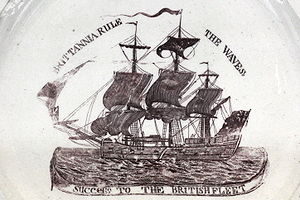This article needs additional citations for verification. (October 2022) |
The Maritime history of the United Kingdom involves events including shipping, ports, navigation, and seamen, as well as marine sciences, exploration, trade, and maritime themes in the arts from the creation of the kingdom of Great Britain[1] as a united, sovereign state, on 1 May 1707 in accordance with the Treaty of Union, signed on 22 July 1706.[2] Until the advent of air transport and the creation of the Channel Tunnel, marine transport was the only way of reaching the British Isles. For this reason, maritime trade and naval power have always had great importance.

Prior to the Acts of Union, 1707, the maritime history of the British Isles was largely dominated by that of England. (See Maritime history of England for more details.)
- ^ Uniting the kingdom?, nationalarchives.gov.uk, accessed 28 January 2011; Acts of Union 1707 parliament.uk, accessed 28 January 2011; Making the Act of Union 1707 Archived 11 May 2011 at the Wayback Machine scottish.parliament.uk, accessed 28 January 2011; The Union of the Parliaments 1707 Archived 2 January 2012 at the Wayback Machine Learning and Teaching Scotland, accessed 28 January 2011; "THE TREATY or Act of the Union". scotshistoryonline.co.uk. Retrieved 12 December 2009.
- ^ "Articles of Union with Scotland 1707". parliament.uk. Retrieved 12 December 2009.
